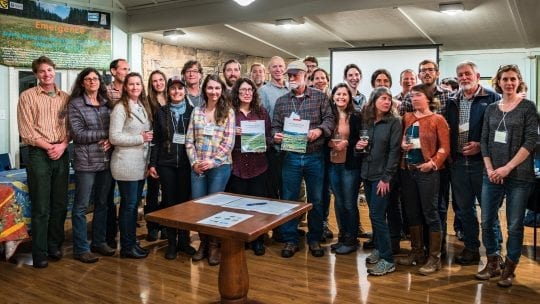CalTrout convenes annual Meadows Conference

Members of the Sierra Meadows Partnership display the Sierra Meadows Strategy after having signed the MOU in support
On February 7th-10th, 2017 California Trout, with support from partners, National Fish & Wildlife Foundation and the CA Dept. of Fish & Wildlife, organized the third Sierra Meadows Workshop at Mayacamas Ranch in Calistoga, California. Over the three days, there were approximately 70 workshop attendees representing more than 20 different State and Federal, non-profit environmental, academic and private consulting agencies.
The purpose of the workshop was to continue to build a broader meadows partnership with a focus on (1) how restoration affects greenhouse gas dynamics and the potential for developing a payment for ecosystem services market through Climate, Community, Biodiversity (CCB) credits and (2) implementation of the newly completed Sierra Meadow Strategy to increase the pace, scale and efficacy of meadow restoration in the greater Sierra.
The first day’s discussions and presentations focused on updates on the research being done to quantify the potential carbon sequestration of restored meadow systems as well as a proposed road map towards CCB accreditation. Days two and three were dedicated to actuating the actions and goals of the Sierra Meadows Strategy, a document recently completed by the Sierra Meadows Partnership to serve as guidance for practitioners, land-managers, funders and policy-makers. To view the workshop agenda and minutes, click here.
The Sierra Meadows Strategy V 1.0 can be viewed here.
Outcomes of the workshop include (1) an understanding of the status and findings of GHG quantification in Sierra meadows projects, (2) a “Roadmap” to developing Climate, Community, Biodiversity standards for accreditation, (3) renewed and formalized (MOU) support for the Sierra Meadows Strategy and (4) working groups and action plans to implement the Approaches in the Strategy to move toward the goal of 30,000 acres of meadows conserved in the Sierra by 2030.
The workshop was very supportive in continuing and increasing momentum for meadow restoration in the Sierra along with the strengthening of an ongoing partnership. Click here to learn more about CalTrout’s Sierra Headwaters Keystone Initiative and the efforts to restore Sierra meadows.
To access presentations, photos and annotated agendas from all 3 Meadows Workshops click here.




